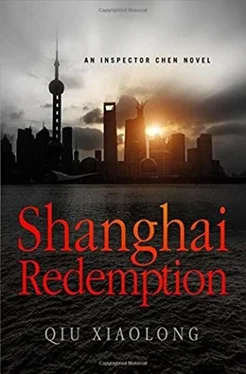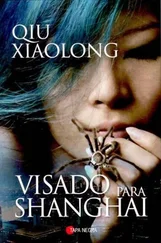A girl, maybe twelve or thirteen, stepped over to the opera table, carrying a pipa taller than herself. After bowing to an invisible audience, she started singing.
To Chen’s surprise, it was an eleventh-century ci poem written by Su Shi, titled “Lines Written in Dinghui Temple, Huangzhou”:
The waning moon hangs on the sparse tung twigs, / the night deep, silent. / An apparition of a solitary wild goose / glides in the dark. // Startled, it turns back, / its sorrow unknown to others. / Trying each of the chilly boughs, / it chooses not to perch. / Freezing, the maple leaves fall / over the Wu River .
He heaved a sigh. He thought that was one of the songs included on Qian’s CD. What was going through her mind while she practiced those lines?
Chen applauded as the girl finished singing. Fifteen years ago, Qian might have been just like her.
He turned to Nan. “What a beautiful piece! I think I’ve also heard it on one of the club’s CDs, sang by someone named Qian. Do you happen to know her?”
“Qian-” Nan said, looking up in surprise. “Why?”
“I met her a short while ago, and she said she sometimes comes to the club.”
“You should have come-” Nan murmured, her eyes suddenly filling with tears.
“What do you mean?”
“She died last night.”
“What!” The news hit like a personal blow.
“Someone broke into her apartment, killed her, and took all her valuables.”
He had suspected something had gone terribly wrong when he had tried to call her from the phone booth and a strange man answered. He was shocked speechless for a minute or two.
A robbery gone wrong? He ruled it out instinctively-it was just too convenient. And the robbery-murder theory certainly didn’t explain the man waiting in her apartment, answering her cell phone. But he wasn’t in any position to contact the Suzhou police bureau about it.
“You look pale,” Nan said. “It’s a shock to all of us. Were you close?”
“I didn’t know her well, but she helped me,” he murmured. “Please tell me more about what happened.”
“No one here knows any details yet. Yesterday afternoon, she came here to the club and paid her monthly membership fee, as always. After she left, some visitors came to the club. They bought her CD, and one of them even bought a copy of her poster, which cost two hundred yuan. After they left, I called her. She was pleased, saying that the money the visitors spent would be her donation to the club.”
“I don’t understand how thieves could have broken into her apartment,” Chen said. “Her apartment is close to the Temple Market, near the center of the city.”
“I don’t know. All I know is that early this morning, while I was still asleep, the cops came to my place. They found me because my number was in her phone’s call log as the last person that contacted her yesterday. The cops asked me a bunch of questions before telling me that she’d been murdered.”
“That must have been awful for you.”
“We’re having a memorial performance for her tonight. We’re performing all the Tang and Song poems that she set to Suzhou opera tunes. It’s our way to remember her. You should come.”
Nan then walked over to a pipa leaning against the wall.
“That’s hers.”
He followed her, reached out to the instrument, and noticed that one of the strings was broken. In ancient China, a broken string was a sinister omen. Touching it, he imagined her playing pipa here, one string, one peg, each reminiscent of the lost years of her youth.
“I’m so sorry I can’t come to the performance tonight,” he said. He thought it was likely that some plainclothes policeman would also be at the evening performance. “I have an important business meeting tonight. But I would like to buy a CD of hers and order a short piece called ‘Zijuan Lamenting at Night’ for tonight’s memorial performance. I’ll pay the fee for the song in accordance to the menu.”
Zijuan was a maid to Daiyu, the heroine of Dream of the Red Chamber . After Daiyu’s death, Zijuan laments the heroine’s tragic fate on the night when Baoyu, the hero, marries another girl.
“That is a very thoughtful choice. It’s the song I’m planning to sing for her tonight. Don’t worry about the fee.”
“No, I want to pay for it,” he insisted. “I only met her twice, and I know so little about her. Can I also ask a favor of you? Can you start recording tonight’s performance as soon as people begin to arrive? I’d like you to record the evening all the way to the end. Not just what the performers sing, but what they say too. Don’t bother burning it to a CD. A cassette tape will do. Here is a thousand yuan. Will that be enough?”
“You’re generous, sir. It’s far more than enough.”
“I’ll come back and pick up the tape in a day or two.”
“Whenever it’s convenient. I’m here most of the time, and if I have to step out, I’ll leave a note about the tape.”
He supposed that was about all Nan could tell him about Qian. He stood up, holding the CD, which also bore the address and contact information of the club, and said his good-byes.
He almost stumbled walking down the stairs. The narrow corridor led him to an overwhelming question.
Did she die because of him?
He might be jumping to conclusions, but if it had been just a random home invasion robbery, why was there a man at her home answering her phone? At the time Chen called, the man must have known that Qian was dead, but he pretended that he would give her his message.
What’s more, the man didn’t know Chen’s identity, but he did have some knowledge about him, such as the name he’d given her, Cao; that he was from Shanghai; and that he was fond of noodles.
The specificity of his knowledge suggested that the man had been stationed in her apartment to ambush Chen.
That confirmed Chen’s earlier suspicion that the phone call she made to him was tapped. It was very likely that that call had led to this tragedy.
While he hadn’t said much during that phone conversation, it was only a matter of time before whoever was behind the murder figured out who “Cao” really was.
AT SIX FIFTY IN the morning, Chen stepped out of the Suzhou-Shanghai train, looked around, almost casually, before he walked into the subway.
At this hour, the subway was already crowded with sleepy-eyed commuters. The subway was a necessity for many, given the perpetual traffic jam in the ever-expanding city. Standing next him, a slip of a girl started dozing off, her head bobbing against his shoulder. He stood still to avoid disturbing her.
He left the station via the number 3 exit, the exit Peiqin had mentioned the other day. It was the one closest to her new restaurant. But it was still too early. He decided to stroll around the neighborhood while he waited. Clustered nearby were a number of convenience stores. A block further east, he glanced down a side street as he walked past, and he came to a stop.
There was a neon sign shining pale, listless in the morning light.
He traced his steps back to the subway, buying a copy of Wenhui Daily on the way. Standing under the subway sign, leaning against a strangely barren tree, and unfolding the newspaper in his hand, he looked like all the others waiting there. Opposite him, a young man planted himself next to a green-painted lamppost, clutching a smartphone.
If this was indeed the exit Peiqin used, he couldn’t miss her. The train she usually took arrived at eight fifteen, she’d said, and the subway was fairly reliable. He glanced at his watch again. He was still fifteen minutes early. He might as well stay put jotting down something on his notebook.
Читать дальше












